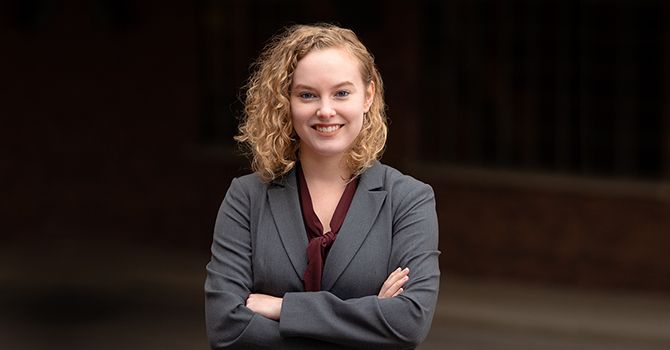The Perfect Fit: A Career That Blends Hard Science and Social Science

Jessica Yaser
Master’s Student in Occupational and Environmental Epidemiology
I never had a favorite subject in high school—everything seemed worthwhile to me. I first became interested in public health when switching between undergraduate majors. First, I was a physics major, because it appealed to my love of science and math, but then I shifted to political science because I value political activism and advocating for good public policy.
In considering why these disciplines were not a good fit for me, I realized I had set up in my mind a competition between the hard and social sciences. When I found public health, it felt like the perfect fit because it is a beautiful balance between the two—and it soon became my undergraduate major at Purdue University.
Sometimes it is necessary to use science to dispel fears, and sometimes it is necessary to use science to bring attention to legitimate problems.
I chose Michigan because the Department of Epidemiology's diverse tracks make it stand out from other schools. The Occupational and Environmental Epidemiology track aligned with my undergraduate policy coursework, my interest in environmental policy specifically, and my desire to become an epidemiologist. Environmental damage and climate change are global problems with many political solutions, and those solutions require detailed technical information about human exposure to environmental factors.
The Occupational and Environmental Epidemiology track is a joint program between the Epidemiology and Environmental Health Sciences departments here at Michigan Public Health. My home department is Epidemiology, but the way this interdisciplinary MPH degree engages and synthesizes so many of my broad interests has opened me up to new career possibilities.
During my studies, I've started working as a Research Assistant at EpidStat Institute, a scientific consulting company that employs a team of epidemiologists, biostatisticians, health economists, and exposure scientists. We use science to answer difficult questions about health and disease causation, and we publish and present on our research. My work mostly involves research on nutritional, environmental, and occupational epidemiology. I didn't expect to do this particular kind of applied research when I started my graduate program, but I do enjoy it because I've learned how to think systematically, write clearly and concisely, and apply my scientific skills to real-world problems.
All epidemiology is social epidemiology.”
As I refine my career path in public health, I look forward to using my degree and training in public health to interpret science and help turn scientific evidence into better policy at all levels. All policy should be evidence-based and informed by worldviews that are fact-based. There's a great deal of fear-mongering in the fields of environmental and occupational health—some of it justified and some of it not. Sometimes it is necessary to use science to dispel fears, and sometimes it is necessary to use science to bring attention to legitimate problems. Both are worthwhile endeavors, and I hope to build a career doing both.
I'm constantly reminded of a refrain I first heard from an Epidemiology professor here at the School of Public Health: "All epidemiology is social epidemiology." Our work is not one or the other—hard science or social science—but a blending of the two, and that is why it is the perfect fit for me.
